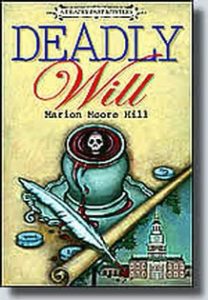 Prologue (1789)
Prologue (1789)
“That’s my scheme, Dr. Franklin.” Nathan Henry inhaled snuff from the back of a ruffled wrist, eyes watching his host for signs of approval. “Is it not a worthy refinement on your own remarkable legacy?”
“Interesting, Henry.” Benjamin Franklin actually thought the plan overly complex, possibly foolhardy. “But have you considered what changes may occur over two centuries? In the way banking and legal business are conducted, for instance.”
Henry stiffened. “Detailed instructions shall guide my executors, sir. They must adapt them to practices then current.”
“Your personal belongings will certainly deteriorate. In any event, why leave such items as a map, a quilt and a rifle to these unknown descendants?”
Henry patted the waistcoat snugging his girth. “The keepsakes are symbolic of my various selves—merchant, domestic man, revolutionary. And my heirs are bound to prize any memento of such an illustrious forebear, in whatever condition. My favorite, of course, is that letter you wrote me from Paris.”
Franklin winced as a kidney stone stabbed him. He had nearly forgotten writing that polite but distant reply to Henry’s fawning missive. Snowflakes wafted through the window he kept ajar winter and summer, yet the room felt close, laden with the scents of snuff and hickory burning in the fireplace.
“You can hardly leave a token for each, Henry, even if you could know how many will then be living.”
“I flatter myself I have anticipated all difficulties.”
Franklin frowned. “The money troubles me most. It should grow to a great sum in two centuries’ time. Have you considered what conflict it may cause among your descendants? Remember what Poor Richard says about man’s character with regard to greed: ‘He’s a fool that makes his doctor his heir.'”
Henry waved away the warning. “Please don’t distress yourself, sir. We may trust my progeny to behave properly.”
Strength spent, Franklin lay back, his thinning locks gray against the creamy pillow. At least he wouldn’t be around to see the consequences of Henry’s folly.
One (2001, pre-
Humming a popular tune, Millie entered the drab lobby at her apartment complex and worked the combination lock on her mailbox. She flipped through the mail: a utility bill, a sweepstakes offer, and a yellow slip of paper indicating that a registered letter awaited her at the post office.
Registered? Anxiety prickled her spine, halted her humming. If Danny’s father was in trouble again, asking for money-
Worse, he might be renewing his bid for custody of Danny. Her mouth went dry. Even if she won again, the fight would be emotionally exhausting, the financial cost devastating-
The lobby door jerked open, and a small figure dashed through.
“Come quick, Mrs. Kirchner! Danny’s hurt!” Her son’s friend Jeff flung the heavy door behind him, banging the outside wall.
The mail slid from her grasp. “Where? Show me!”
She grabbed his small shoulder and pushed him from the modest brick building. He led her towards a tiny park across the street.
God, Millie thought with a hammering heart, Danny’s fallen on his head and killed himself.
* * *
Later, in the afternoon, she sank into her favorite chair on the nursing home patio, grateful for the breeze stirring her ponytail. Propping an elbow on a wrought-
* * *
Millie rubbed a chigger bite on her wrist, and heard paper crackle under her forearm. “Oh–the mail. I’ve been running all day, had to deposit my check and go by the post office at lunchtime–”
* * *
Millie picked up the fat, official-
“I haven’t even opened this one yet. Can’t be good news. I swear, if Jack’s trying again to get custody of Danny— Philadelphia? What’s he doing up there? Jack always said he’d never go north of the Red River except in chains or a pine box.”
“It’s a radical idea, but you could open the letter and see.”
“Anybody ever tell you what an old nuisance you are?” Millie slid a fingertip under the flap and took out several sheets of stationery.
“That’s how they wake me for breakfast: ‘Yo, Old Nuisance!'”
Millie smiled, then, drawing a resigned breath, ran her eye over the first paragraph. She stopped, read it again.
“Oh! Oh, wow!”
A sobering thought struck. This had to be a mistake. Still, the letter was addressed to her…
She re-
Sylva fidgeted with the loose gold band on her finger. “So what’s the bad news from your ex?”
A jumble of conflicting emotions made Millie feel her head was spinning. She mustn’t let herself believe the letter’s tidings—if there later proved to be a Catch 22, the disappointment would be crushing—but oh, if they should be true! She fought to stay calm.
“It’s the strangest thing I’ve ever heard of, Sylva,” she said through quivering lips.
“Strange how?”
“Just plain weird.”
“I don’t have many years left, Kirchner.”
“Well, it’s—”
A memory of Danny’s triumphant grin this morning brought Millie up short. This could be someone’s idea of a prank, another cruel one. But who disliked her that much? And why such an elaborate scheme?
Maybe it wasn’t a joke. Just maybe.
“This lawyer…Arthur Pope…says there’s a…legacy. Danny and I are heirs of someone named Nathan Henry.” Spoken aloud, the words seemed even less believable.
“A rich relative!” Sylva cried. “Congratulations, hon! I gather you two weren’t close.”
Millie smiled ruefully. In the elderly woman’s privileged sphere, inheriting wealth was probably a real possibility, perhaps even expected. The thought steadied Millie, restoring something of her usual protective cynicism.
“I’d never even heard of him till now,” she said. “But get this part, Sylva: the letter says Henry died two hundred years ago.”